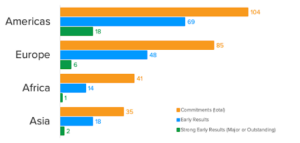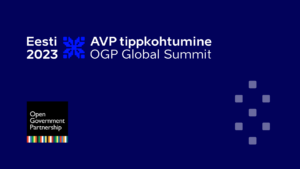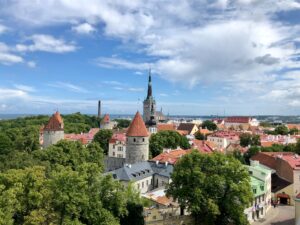Five key reflections from the latest IRM Results Reports
The Independent Reporting Mechanism (IRM) recently published 23 Results Reports for 2019-2022 and 2020-2022 OGP action plans. These assessed 265 commitments from Africa and the Middle East, Asia and the Pacific, the Americas, and Europe. 149 commitments led to early resultsEarly results refer to concrete changes in government practice related to transparency, citizen participation, and/or public accountability as a result of a commitment’s implementation. OGP’s Inde... More (referring to concrete changes in open government practice as a result of implementation), including 27 commitments that showed major or outstanding early results.

For the first time, these reports also contain a Key Observations section. In total, the 23 Results Reports provide 99 insights and overall reflections on factors that enabled or inhibited change or early results. Here’s a look at the most common and interesting observations and relevant country examples.
Civil Society and Citizen Engagement Matters
Examples across the Results Reports emphasized the positive impact of civil society engagement on commitment completion and results. Denmark, the Czech Republic, and Mexico saw stronger results in commitments where the engagement of civil society and citizens was integral to commitment implementation. In Costa Rica, sharing experience and knowledge between civil society organization ACCESA, the Ministry of Communication, and the Ministry of Housing and Human Settlements helped improve the implementation of public participation mechanisms in spatial planning. Learning from this cycle and planning towards the future, stakeholders in Argentina are looking at mainstreaming genderOGP participating governments are bringing gender perspectives to popular policy areas, ensuring diversity in participatory processes, and specifically targeting gender gaps in policies to address gov... More equality into action planAction plans are at the core of a government’s participation in OGP. They are the product of a co-creation process in which government and civil society jointly develop commitments to open governmen... processes to encourage further civil society engagement.
Freedom of information is a fundamental human right. In this video, Danica Orcullo explains how the Philippines’ OGP action plan facilitated the expansion of the right to access government information at the local level.#OpenGovWeek@foi_ph pic.twitter.com/h2CBit9aUv
— OGP Independent Reporting Mechanism (IRM) (@OGP_IRM) May 8, 2023
National action plans have supported local reforms
We also found many successful examples of nationally-led initiatives to introduce open government approaches at the local level. In the Philippines and Côte d’Ivoire, commitments focused on addressing specific policy areas, like freedom of information and participatory budgeting, were implemented locally. In Argentina, Mexico, and Nigeria, commitments directed at the local level sought to cast the net wide to implement open government, running national programs to build local, implementing common standards at the local level, and developing local action plans.
Incremental Changes Can Offer Significant Results Over Time
Another common observation in this batch of reports is how incremental changes over multiple action plans finally developed into significant results. Indonesian, Liberian, and Czech government and civil society stakeholders used their action plans to advance open government incrementally by adapting commitments where they had previously faced obstacles to implementation. In Côte d’Ivoire, small advances in participatory budgeting commitments over various action plans have built up an impressive cumulative effect by expanding the initiative to over 50 communes (around a quarter of all communes in the country). From the outset, Estonia had a longer-term strategic plan to introduce reform around public participationGiving citizens opportunities to provide input into government decision-making leads to more effective governance, improved public service delivery, and more equitable outcomes. Technical specificatio... in policymaking and implemented this in smaller manageable pieces over a series of OGP action plans.
The public has a right to know who is influencing public policy and decision-makers. Steven Hristo outlines the early results of implementing lobbying transparency in Estonia.#OpenGovWeek pic.twitter.com/mX6Kx0YHRP
— OGP Independent Reporting Mechanism (IRM) (@OGP_IRM) May 11, 2023
Effective Leadership Needs Broad Support
The observations highlighted how open government reformers taking leadership on an issue have been most effective at driving change with the support of an enabling environment in favor of reform. The political initiative of the first cabinet of Prime Minister Kaja Kallas and support from then Minister of Justice helped public officials in Estonia secure buy-in from the political and administrative apparatus to implement lobbying transparency reforms. A key civil servant in Liberia’s Business Registry drove collaboration on advancing beneficial ownershipDisclosing beneficial owners — those who ultimately control or profit from a business — is essential for combating corruption, stemming illicit financial flows, and fighting tax evasion. Technical... More transparencyAccording to OGP’s Articles of Governance, transparency occurs when “government-held information (including on activities and decisions) is open, comprehensive, timely, freely available to the pub... More with support from government, civil society, private businesses, and international partners.
Sufficient Resources at the Right Time
Adequate financial resourcing, human resources, and technical know-how also clearly affected implementation of commitments in this batch of Results Reports. Just over half (53 percent) of the 265 commitments assessed, were substantially or fully completed. The lack of resources, or sometimes the redistribution of resources to deal with COVID-19, delayed or stopped commitment implementation in many places and across all regions. On the other hand, Ecuador had significant international support and resourcing, which reduced the financial burden on the state and resulted in 80% of its commitments being substantially or fully completed. In some places, the lack of resourcing stemmed from commitments not being developed or aligned with regular budgeting cycles. In Costa Rica, however, the Ministry of Housing and Human Settlements and the Ministry of Security incorporated commitments linked to respective strategic plans, meaning they had the proper budget, human resources, and prioritization to be completed.
The common observations from IRM Results Reports provide interesting insights and useful reflections on what has helped achieve results in 23 countries. For OGP members and the wider open government community, these reflections can serve as useful pointers for investing energyEnsuring universal access to sustainable, dependable, and affordable energy is critical to every aspect of prosperity. Increasing public oversight and transparency in the energy sector can help to ens... More and resources as OGP begins to deliver its new strategy over the next five years.
No comments yet
Related Content

2023 OGP Global Summit: Tallinn, Estonia
The Estonian Government will host the 2023 OGP Global Summit on September 6-7 in Tallinn, Estonia.

OGP’s 2023-2028 Strategy
OGP’s 2023-2028 strategy is now available. With over 1,000 contributions, the open government community helped to identify emerging strategic directions.
 Champions
Champions Estonia’s Journey of Open Government Reforms
This September, Estonia will host the 8th OGP Global Summit. Explore Estonia’s development through six action plans, and how the government has been able to institutionalize co-creation, public participation, transparency…


Leave a Reply